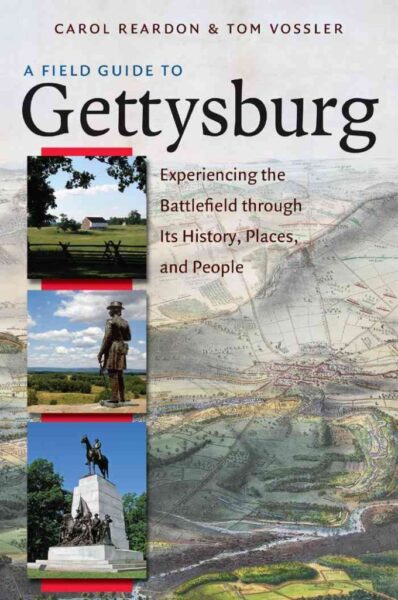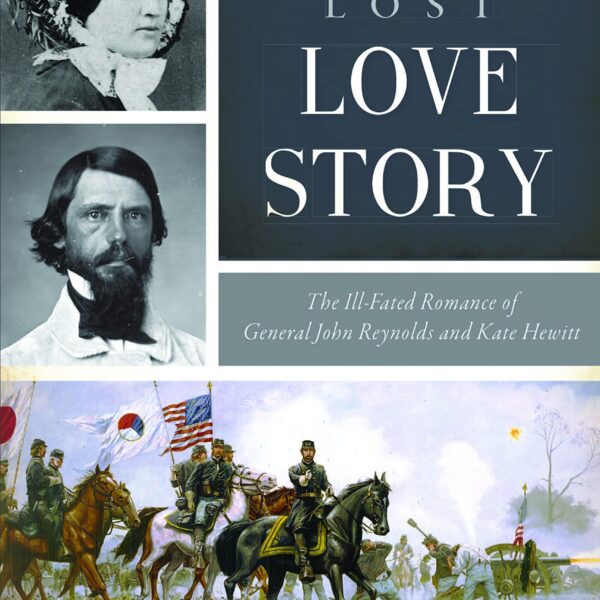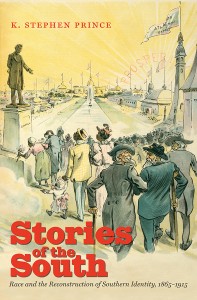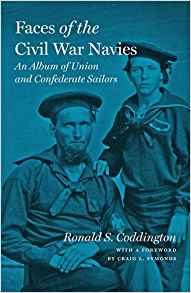John Quincy Adams and the Politics of Slavery: Selections from the Diary by David Waldstreicher and Matthew Mason. Oxford University Press, 2016. Cloth, ISBN: 978-0199947959. $29.95.
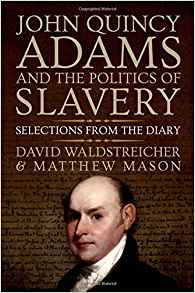 The past twenty years have witnessed an explosion of historical research on John Quincy Adams. To be certain, as the son of a founding father, a successful politician in his own right, and a living link between the Revolutionary and Jacksonian generations, Adams has traditionally occupied a pride of place in early American political history. Sir Anthony Hopkins’ energetic portrayal of Adams as a cantankerous anti-slavery advocate in Amistad (1997) and Ebon Moss-Bachrach’s depiction of an idealistic young president in John Adams (2008) have introduced JQA to a new generation of Americans.
The past twenty years have witnessed an explosion of historical research on John Quincy Adams. To be certain, as the son of a founding father, a successful politician in his own right, and a living link between the Revolutionary and Jacksonian generations, Adams has traditionally occupied a pride of place in early American political history. Sir Anthony Hopkins’ energetic portrayal of Adams as a cantankerous anti-slavery advocate in Amistad (1997) and Ebon Moss-Bachrach’s depiction of an idealistic young president in John Adams (2008) have introduced JQA to a new generation of Americans.
The recent efforts of the Massachusetts Historical Society to place Adams’s voluminous papers online has granted scholars unparalleled access to the sixth president’s political and personal life. David Waldstreicher’s and Matthew Mason’s John Quincy Adams and the Politics of Slavery draw from these papers to depict the evolution of Adams’ views towards slavery. This work thus parallels other recent works, such as Harlow Giles Unger’s John Quincy Adams (2012) and Joseph Wheelan’s Mr. Adams’s Last Crusade (2009).
However, unlike Unger and Wheelan, Waldstreicher and Mason combine excerpts from Adams’s diary with brief explanatory paragraphs. By letting Adams speak for himself, this work thus allows readers to “see Adams’s diary in part, and increasingly over time, an exercise in managing and working through the problem of slavery” (xv).
To be certain, this volume retreads well-worn ground in chronicling Adams’s cautious emergence as a slavery opponent. For instance, the authors draw attention to Adams’s oft-cited 1820 private acknowledgment that “Slavery is the great and foul stain upon the North American Union” (76). Waldstreicher and Mason also recount Adams’s increasingly bold anti-slavery stances during the gag rule controversy and the Amistad case of the 1840s. As such, like previous Adams biographers, they recount the standard narrative of a privileged, ambitious, and intelligent politician with a truly nationalistic mindset—one who sought, over the course of four decades, to grapple with slavery in a way that would neither derail his political career nor spark disunion.
A key strength of John Quincy Adams and the Problem of Slavery thus lies not in its recounting of Adams’s well-known public stances towards slavery, but in its excavation of the lesser known ways in which JQA came to envision the peculiar institution as both a political and moral issue. For instance, Waldstreicher and Mason point out that contrary to legend, Theodore Roosevelt was not the first President to host an African-American at the White House. John Quincy Adams met with Reverend Richard Allen eighty years before TR’s memorable dinner with Booker T. Washington. Perhaps in no small part due to these conversations with Allen, Adams came to see slavery and its energetic defenders in Congress as not merely immoral, but a threat to the Union that he and his family had done so much to create.
At times, Waldstreicher’s and Mason’s attempts to depict Adams’s growing sensitivity to the immorality of slavery do not fully take into account the way that Adams, as a career minded politician, balanced the issue with other political considerations. For instance, Adams refused as Secretary of State to aid Great Britain in fighting the Atlantic slave trade, primarily out of national economic interests. As Adams remarked to British Ambassador George Canning in 1822, “He [Canning] asked if I could conceive of a more greater and atrocious evil than this slave-trade. I said, Yes: admitting the right of search by foreign officers of our vessels upon the seas in time of peace; for that would be making slaves of ourselves.” This willingness to compare the horror of the Middle Passage to the searching of American ships by British authorities stands in sharp contrast to Adams’s private dislike of slavery. Likewise, a fuller discussion of how Adams’s promotion of the Monroe Doctrine served to protect American trade with slave based Spanish colonies in the Caribbean might help to explain his initial reluctance to take a more active stand against the slave trade. Conversely, twenty years later, Adams would take an unpopular stand in supporting the British war effort during the First Opium War, a stance taken to show support for the nation whose navy was doing the most to prosecute the lantic slave trade.
Minor quibbles aside, this collection of primary sources provides important insight into John Quincy Adams’s views on the most divisive issue of his generation. Waldstreicher’s and Mason’s work should command an impressive place on the growing shelf of works exploring the life of the sixth president.
Thomas H. Cox is an associate professor of history at Sam Houston State University.

